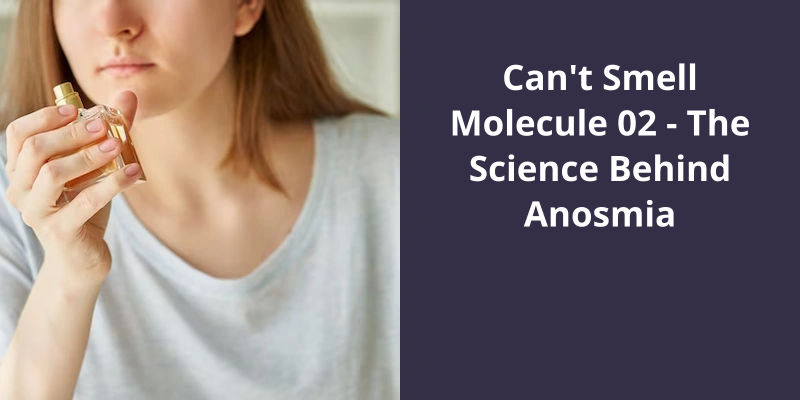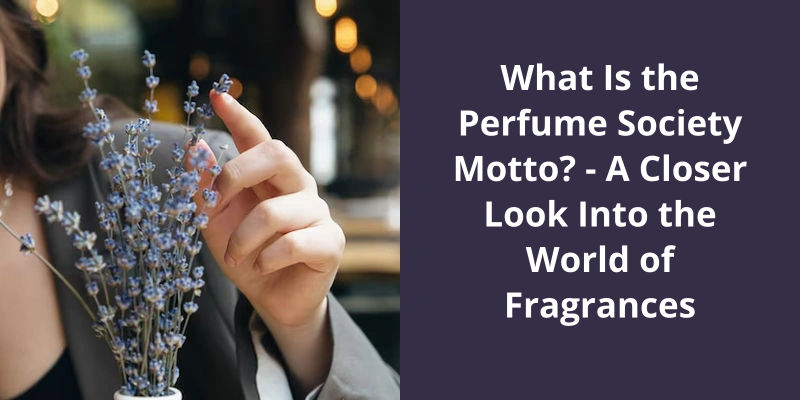Molecule 02 is a fragrance by Escentric Molecules, known for its unique, single-note scent derived from ambroxan, a chemical compound naturally occurring in ambergris. Some individuals may not be able to smell Molecule 02 because of something called olfactory fatigue, a temporary, normal inability to distinguish particular scent after a prolonged exposure to that airborne compound. Alternatively, some individuals might have a certain degree of permanent anosmia (loss of sense of smell) to ambroxan, either congenital or acquired. Hence, if they can’t smell Molecule 02, it could be due to either olfactory fatigue or anosmia. It can also be because Molecule 02 is known to be a subtle scent, which can sometimes seem ‘invisible’ to the wearer but apparent to others.

Can You Smell Molecule 01 on Yourself?
The molecule in Molecule 01 is iso E super, which is a synthetic compound that enhances natural pheromones and blends with the individuals natural scent. Because it enhances the wearers natural scent, it may not be immediately noticeable to the wearer themselves.
However, some people report being able to sense Molecule 01 on themselves after wearing it for a while, especially if they use it regularly. This could be due to the scent becoming ingrained in their clothes or skincare routine, rather than being directly detectable on the skin.
It’s also worth noting that some people may be more sensitive to the scent than others. Our sense of smell is highly individual, so what may be noticeable to one person may not be detectable to another.
The Science Behind Iso E Super and How It Enhances Natural Pheromones
Iso E Super is a synthetic molecule that enhances the natural pheromones produced by our body. It works by amplifying the scent signals that we emit to attract potential mates. The science behind this phenomenon lies in the way our brain perceives scent information. Iso E Super has a structural similarity to a compound found in sandalwood that activates the same receptors in our nose, creating a long-lasting scent and boosting our natural pheromones’ effectiveness.
There are several factors that can affect how a perfume smells on a person’s skin. One of these factors is the ingredients used in the fragrance. In the case of Molecule perfume, which only contains one ingredient, it could be that the aroma-molecule Iso E Super isn’t detectable on some individuals. This is because people have varying sensitivities to certain fragrance materials, including Iso E Super.
Why Does Molecule Perfume Not Smell on Me?
This may be because people have varying levels of receptors in their olfactory system. In other words, some people may be genetically predisposed to better detect certain fragrance materials, while others may be less sensitive. So, if you’re someone who can’t smell Molecule 01, it could simply be that you’re less sensitive to Iso E Super. It’s also possible that your nose becomes desensitized to the fragrance, which can happen with any scent you wear regularly.
Another factor that can contribute to the lack of scent from Molecule 01 is the pH level of your skin. Fragrances typically work best on skin with a slightly acidic pH, but if your skin is too alkaline, the fragrance may not be able to properly blend with your skin. This can result in a weak or non-existent scent. It’s recommended to use unscented lotion or oil to moisturize your skin before applying the perfume to achieve the best results.
Additionally, the amount of perfume you apply can also affect it’s scent on you. Molecule 01 is a minimalist scent, and as such, it may require a bit more product to be noticeable. It’s often recommended to apply the fragrance directly to the skin, rather than spraying it in the air and walking into it. This will allow the fragrance to properly blend with your skin and be more detectable.
Finally, it’s important to note that a perfumes scent can also be impacted by environmental factors. Things like humidity, temperature, and wind can all affect how a fragrance smells on you. It isn’t uncommon for a perfume to smell different in different seasons or environments. It’s always a good idea to test a fragrance in various situations to determine how it will wear on you.
These can include genetic differences in olfactory receptors, pH level of the skin, amount of product used, and environmental conditions. It may take some experimentation to find the right combination for you, so don’t be discouraged if it doesn’t immediately work. With some trial and error, you may discover a way to wear Molecule 01 that works perfectly for you.
Now that we’ve touched on the mystique of Molecule 01, it’s important to delve deeper into it’s composition and effects on the senses. While some see it as a dangerous seductive tool, others view it as a unique and captivating scent that evokes personal connections and memories. In this article, we will explore the origins of Molecule fragrance, how it works, and why it’s popularity continues to thrive.
What Is Molecule Fragrance?
Molecule 01 is a fragrance that’s taken the world by storm due to it’s unique approach to scent. The fragrance is composed of a singular molecule called Iso E Super, which has been carefully extracted and purified to create a scent that’s both subtle and unforgettable. This molecule is what gives the fragrance it’s signature musky undertones, which have been described as both woody and sensual.
It’s unique composition and powerful effect on the human psyche make it a fragrance that’s both intriguing and unforgettable.
The Science Behind Fragrance and How Molecules Interact With Our Sense of Smell
This topic explores how fragrances work and how the molecules of the scents interact with our sense of smell. It delves into the science behind the way our noses detect odors and how the brain interprets them. Understanding fragrance science can help us better appreciate the art of perfumery and develop new fragrances.
Source: Molecule 01 – Pure Scent, Iso E Super
Now that we understand the unique characteristics of Molecule 02, let’s explore it’s olfactory profile. Despite it’s name, Molecule 02 is actually an aroma chemical called Ambroxan. It’s scent is described as fresh, clean, and mineral-like, with a subtle hint of amber and woodiness. But the question remains: can you actually smell it?
Can You Smell Molecule 02?
Molecule 02 has become a popular fragrance among perfume enthusiasts in recent years due to it’s unique composition. Unlike most traditional fragrances that contain a variety of different notes and ingredients, Molecule 02 is made up of one single aroma chemical called Ambroxan. This chemical is derived from ambergris, a substance that’s produced in the digestive system of sperm whales.
When you first smell Molecule 02, you may notice that it’s a very subtle and understated scent. This is because Ambroxan is a very light and airy fragrance note that doesn’t have a strong odor on it’s own. However, when it’s combined with other fresh and aquatic fragrances, it can add a noticeable depth and complexity to the scent.
One of the interesting things about Molecule 02 is that it seems to have a different effect on each person who wears it. Some people report that they can smell the fragrance very strongly on themselves, while others have a more muted experience. This is likely due to the way that the fragrance interacts with each individuals body chemistry.
Because it doesn’t have a very strong aroma on it’s own, it can be difficult to detect if worn alone.
Whether worn alone or layered with other fragrances, it offers a subtle and understated scent that’s both refreshing and intriguing. So if youre curious about this unique fragrance, be sure to give it a try and see what all the fuss is about!
The History Behind the Use of Ambergris in Fragrances
- The use of ambergris in fragrances goes back to ancient times, with it’s first recorded use dating back to ancient Egypt.
- Ambergris is a substance produced in the digestive system of some species of sperm whales, and it’s primarily used in perfumes for it’s musky and sweet scent.
- During the Middle Ages, it became a highly sought-after luxury item in Europe, with many wealthy individuals using it as a personal fragrance.
- Ambergris was also used for medicinal purposes, as it was believed to have a number of healing properties.
- In the 20th century, the use of ambergris declined due to the emergence of synthetic fragrances, but it’s still highly prized by luxury fragrance brands and collectors.
- While the use of ambergris is controversial due to it’s source, many countries regulate it’s harvesting and sale to ensure sustainability and humane practices.
Perfumery is an art form that’s evolved over centuries, and yet, the science behind it’s equally fascinating. Among the many factors that affect how a fragrance smells on one’s skin, the most intriguing one is the molecule behind the scent. One such molecule is Iso E Super, which is the star of the fragrant molecule perfume range. Interestingly, this molecule has a remarkable quality that makes it smell different on every person, giving them a unique olfactory signature.
What Molecule Perfume Smells Different on Everyone?
Perfume is an interesting phenomenon that’s fascinated humanity for centuries. It’s a mixture of aromatic compounds, fixatives, and solvents that evoke emotions and memories. However, one molecule perfume stands out from the rest. Molecule 01, with it’s enticing fragrance, contains a unique molecule called Iso E Super. This synthetic ingredient has captured the imagination of many perfume enthusiasts, and heres why.
Iso E Super is a versatile ingredient that’s often used as a fixative in perfumes. It adds depth to fragrances and enhances their longevity. Despite it’s widespread use, Iso E Super has an intriguing property – it smells different on everyone. Scientists have yet to identify why this is the case, but one theory suggests that it interacts with the natural oils of our skin, creating a personalized scent that’s unique to each individual.
This perfume has garnered a cult following due to it’s ability to create a different experience on each person. Some describe the scent as woody, while others describe it as musky. The fact that it’s so variable is part of what makes it so alluring.
The molecule perfume market has exploded in recent years, but Molecule 01 has remained a top-seller due to it’s unique characteristics. Some speculate that the reason it’s called Molecule 01 is because it was the first perfume to use a single molecule as it’s defining ingredient. This minimalist approach is unpretentious yet incredibly successful, as the fragrance remains popular with both men and women.
The Art of Perfumery and the Process of Creating a Fragrance
- The process of creating a fragrance involves a combination of scent notes and chemical compounds to create a unique blend.
- Fragrances can be created for both personal use and commercial use, such as for perfumes, lotions, and candles.
- The art of perfumery dates back thousands of years and has roots in ancient civilizations such as Egypt, Greece, and Rome.
- Natural ingredients such as flowers, trees, and herbs have been used in perfumery since ancient times.
- In modern times, synthetic ingredients are also commonly used in fragrance creation.
- Fragrance designers, or perfumers, use a combination of creativity, science, and technical skills to create a successful fragrance.
- The creation process can take months or even years to perfect, with multiple iterations and adjustments made along the way.
<li.Fragrances are categorized into scent families such as floral, citrus, oriental, and woody.
<li.Upon completion, a fragrance undergoes rigorous testing to ensure quality, safety, and longevity.
Conclusion
In summary, the inability to smell molecule 02 highlights the complexity of our sense of smell and the critical role it plays in our lives. Despite being one of the most fundamental senses, there’s still a lot we don’t understand about it. However, ongoing research and advancements in technology are helping us unravel the mysteries of the olfactory system, and there’s hope for those who suffer from anosmia. It is, therefore, essential that we continue to invest in research aimed at improving our understanding of the sense of smell, and finding innovative ways to restore it when it’s lost.





